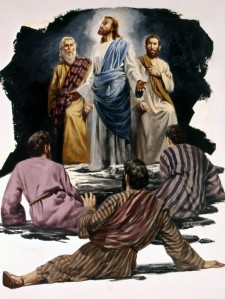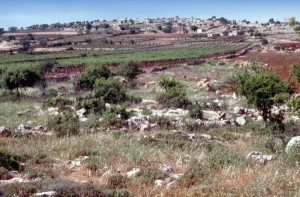This series began in Part One as a search for a more meaningful answer to an aspiring young Christian’s question: “Why did God send His only son to die?” The short answer “to save us from our sins,” while correct, really only serves to raise more questions. In part 2, we looked at what sin is, why it matters so much to God, and why it should matter to us. In part 3, we delved into God’s response to sin. In all of that discussion, we have made great mention of the fact that God has a plan for our salvation. In part 4, we looked at how Jesus really fits into that plan. But what were God’s people looking for in a Messiah? And why did God plan such a horrible death for Him?
The “Missed” Messiah

John the Baptist told his disciples that Jesus was the Lamb of God, the Messiah, God’s Son, who would give his life for his followers — John 1:29-41
The Jews had been waiting for the Messiah to come for thousands of years. But what kind of Messiah were they expecting – especially during the time that Jesus actually did come? By and large, what many of them were hungry for in a Messiah was one that would lead Israel to greatness as a power in the world. After all, he was to be the son of David. They wanted him to be a great military leader that would first defeat the Romans who ruled and oppressed them.
But for people at that time, getting them out from under the thumb of Roman rule was just the beginning. They wanted a king that would eventually lead them to be the kind of power in the world that Israel enjoyed being during the reign of David – mighty and feared – possibly even to replace the Romans as the great power of the world.
In Matthew 2:1-5, when Herod learned of the birth of the Christ, the chief priests and scribes quoted Micah 5:2 in Matthew 2:6, saying:
“And you, O Bethlehem, in the land of Judah,
are by no means least among the rulers of Judah;
for from you shall come a ruler
who will shepherd my people Israel.”
So Herod feared for his position, because he too assumed this Messiah would be a king of an earthly kingdom. In John 6:15, when Jesus was at the height of his popularity with the people, the multitudes were ready to make that kingship a reality in their own way:
“Perceiving then that they were about to come and take him by force to make him king, Jesus withdrew again to the mountain by himself.”
And in Acts 1:6, just before Jesus ascended to heaven, the apostles (not yet having received the Holy Spirit) demonstrated that they still didn’t “get it” either: (“So when they had come together, they asked him, ‘Lord, will you at this time restore the kingdom to Israel?’”). So focused were so many of the people of that time on an earthly kingship for the Messiah, that they overlooked completely prophecies such as that of the “Suffering Servant” in Isaiah 53 or others such as Psalm 16:8-11 (“you will not abandon my soul to Sheol, or let your holy one see corruption”) that clearly predicted a different course for God’s anointed.
Sadly, many of those who longed most for the coming of the Messiah completely missed Him, when he was right under their very noses.
Why Death on a Cross?
Although the crucifixion of Jesus is the most famous of all time, it was not an uncommon means of execution from about 500 BC until the 4th century AD – one that was used by the Romans, certain Greek-Macedonian states, and the Carthaginian empire, to name a few. The Jews of Jesus’ time would have been very familiar with this means of execution. This brutal and very public display of execution was usually reserved for those who committed the most heinous of crimes. It was abolished by Emperor Constantine I in about 337 AD.

English: The Crucifixion, Genoa Svenska: “Korsfästelsen”. Chiesa del Gesù, Genua. (Photo credit: Wikipedia)
So with respect to fulfilling the Scriptures concerning the suffering that the Messiah would have to endure, crucifixion fit into that plan perfectly, as only an execution inflicted with torture could. A quick death by some other means (such as beheading in the case of the apostle James (Acts 12:1-5) ), while certainly painful, would not serve to accomplish the intense suffering prophesied in such passages as in Isaiah 53, nor the wounding predicted in that same passage and others such as Zechariah 12:10. Accompanied by the beatings and scourging (Matthew 27:25-26, John 19:1), it also fulfilled the prophecy in Isaiah 52:13-14 of the Messiah being so disfigured from them that He was hardly recognizable. Moreover, being “lifted up” on the cross was the fate Jesus prophesied for Himself (John 3:14-15, Matthew 20:17-19, John 8:28), as well as that prophesied in Isaiah 52:13.
What Did the Death of Jesus Really Cost?
It is important to understand how much love was involved in the sacrifice of Jesus on that cross. Almost everyone in our society has at least heard John 3:16 quoted (“For God so loved the world, that he gave his only Son, that whoever believes in him should not perish but have eternal life”). But how often is that verse quoted without much thought behind it? After all, He was the Son of God, right? It is easy to forget how much He gave up, and how human He became for us. To be sure, God reveals to us what we need to know, but He does not reveal everything there is to know about many things; and that includes His relationship as the Father to Jesus as the Son.
Jesus clearly speaks of himself and God as separate entities (John 5:30). God also does the same in such verses as Matthew 3:16-17 (“This is my beloved Son, with whom I am well pleased.”). Yet John 1:1 makes it clear that Jesus (“the Word”) was God. Peter (2 Peter 1:1) and Paul (Titus 2:11-13) both tell us that Jesus is “God and Savior.” Philippians 2:5-6 speaks of Jesus having been in the form of God and having equality with God. Even Thomas, having his doubt removed after the resurrection, recognized this as he exclaimed in John 20:28, “My Lord and my God!” So the answer, in our limited ability to understand such things, is that Jesus was both God and a separate being – the Son.
The relevance of all of this to the willing sacrifice of Jesus is that God’s love for us prompted Him to have His only Son – and in a very real sense (the depths of which we cannot fully understand) a part of Himself – to come into this world as a physical man, to live and love as a man, to feel pain and sorrow just as we do, and to suffer and die a cruel and tortuous death at the hands of the very people He was trying to save.
In Part 6, we will conclude this series with a look at more of what Jesus’ death and resurrection accomplished, as well as what is required of us to gain our salvation.
/Bob’s boy
___________________
image © V. Gilbert & Arlisle F. Beers
Please note: I did not design the reading plan that I am following in my blog. All of my comments in this blog, however, are solely my responsibility. When reading ANY commentary, you should ALWAYS refer first to the scripture, which is God’s unchanging and unfailing word. Reading schedules, as well as a link to the site where you can get the reading plan that I’m currently following for yourself can be found on the “Bible Reading Schedules” page of my website at http://graceofourlord.com. For questions and help, please see the “FAQ” and “Summaries” pages there.
Share this (better yet, share the Bible selection with someone) :
















